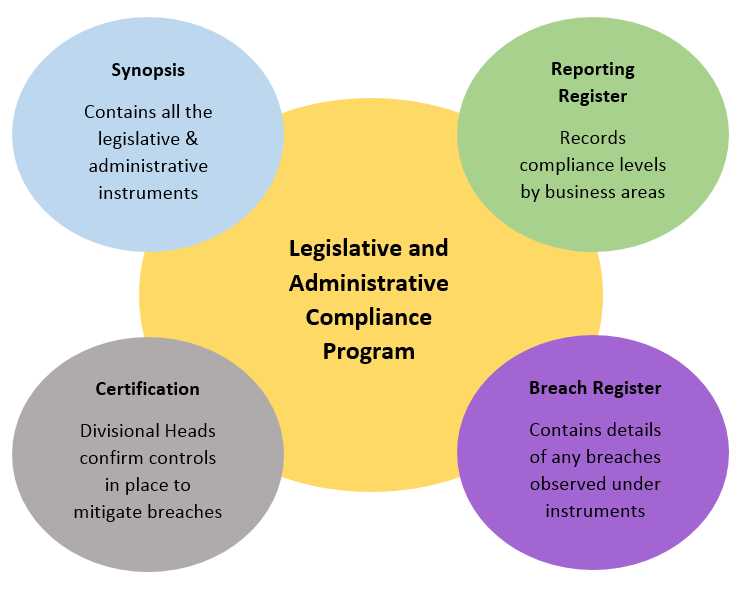Automatic language translation
Our website uses an automatic service to translate our content into different languages. These translations should be used as a guide only. See our Accessibility page for further information.
The LACP supports the Secretary’s compliance with Section 3.6 of the Government Sector Finance Act 2018 (GSF Act) and the attestation under Treasury Policy Paper (TPP) 20-08 Internal Audit and Risk Management Policy for the General Government Sector.
Employees (at all levels) are responsible for ensuring compliance with our external legislative and administrative requirements.
The LACP key components:

Business areas across DCJ are required to self-assess and report on compliance against applicable NSW and Commonwealth legislative (Acts & Regulations) and administrative (government issued Circulars, Policy Papers and Memorandums) instruments.
Each accountability should be assigned to the relevant Policy Owner/s.
Please note: Policy Owners ARE NOT held responsible for breaches across the department.
The LACP is not about naming and shaming. Where non-compliance is identified, the Business Ethics and Compliance Unit (BECU) will work closely with policy owners to assist with developing mitigation strategies to prevent and reduce the risk of future breaches.
The BECU provides quarterly reports to both the DCJ Executive and the Audit and Risk Committee (ARC) on the progress by business areas regarding any mitigation strategies they are required to implement to prevent and/or mitigate future non-compliance.
The LACP supports:
The Secretary by:
Management by:
Staff by:
Strategic oversight for the DCJ Executive and the ARC that business areas:
The LACP Synopsis and Reporting Register are provided to each division to complete their annual self-assessment for the previous financial period against each relevant instrument and/or accountability. This is also an opportunity for business areas to identify any instruments that may need to be included.
The head of the division (e.g. Deputy Secretaries, Chief Executive, etc) is required to certify that:
The BECU analyses and reports the compliance results to the:
Legislative and Administrative Compliance Program (LACP) Policy and Procedure (PDF, 334.2 KB)
Advice and support is available from the Business Ethics and Compliance unit (BECU) via the LACP@dcj.nsw.gov.au mailbox.
11 Dec 2023